
Youth Community

Aid Ukraine

Order Why Israel Resources

Support our ministry

Subscribe newsletter

Israel & Christians Today

Biblical understanding about Israel
From Soviet apartment to kibbutz
Text: Richard Donk | image: Henk Visscher
Sourced with permission from Reformatorisch Dagblad.
The war in East Ukraine resulted in a flow of refugees. Many Jews take this opportunity to emigrate to Israel. This is a story about two Jewish families who exchange icy Eastern Europe for a kibbutz in the Negev Desert.
A grey Soviet apartment in Zaporozhe in Ukraine. Alarmed pigeons flutter around. A runaway dog skulks around a refuse heap. There are no elevators. So we walk the staircases to the apartment of Olga (29) and Aleksandr Tzarenko (30) and their children Yevgenia and Anna. They are about to ‘make aliyah’ – to emigrate to the Promised Land. Away from the brutality of war that has battered the east of their homeland for so long. And the danger, most definitely, is not something of the past.
Their home is packed with luggage, neatly sealed in plastic. Three pieces per person; a total of twelve bags. In those bags they carry their Ukrainian past. Now reduced to a dozen bags. And, of course, there are the memories in their heads.
They aren’t nervous, says Aleksandr. But he is concerned. “As head of the family, it is my responsibility to care for my wife and children. My priority, therefore, is to find work in Israel as soon as possible.”
Aleksandr managed a small-scale transport business in Ukraine. He trusts that he will be able to find a similar position in Israel. It is essential, therefore, to be conversant in Hebrew. Therefore, the family has been studying the language since February. Olga’s reply, when asked to what extent they have mastered Modern Hebrew, is: “Kacha, kacha” (so-so). “We have tried to learn as much as possible.”
Olga feels optimistic about her family’s future in Israel, despite having to leave a large family behind in Ukraine. “We close the door to our past, and we open the door to our future.”Aleksandr is not afraid of attacks and other forms violence in Israel. “What we have here is equal to war. And in Israel, at least, we know the government will protect us. In Ukraine it is far less self-evident.”
Aleksandr’s mother stands forlornly in the hallway. “I’m concerned about the journey and all that awaits them”, she whispers. “But I do not wish to change their decision. It is their life, and I wish them the best. One day I will, hopefully, be able to join them.”
Why is she not leaving now? “My parents’ graves are here. That is very important to me. And I do not find the hot Israeli climate very attractive.”
Elsewhere in Zaporozhe, Marina and Denis Pleshkow (both 39) and their young boys Sasha and Pasha, are also preparing to leave for Israel. A handful of family members watch, as twelve pieces of numbered luggage are loaded into a Christians for Israel (C4I) bus. C4I has been helping Jews to immigrate to Israel for almost twenty years now.
The Aliyah Field Worker of Christians for Israel in Ukraine, Koen Carlier, gives a short speech before the start of the journey to the airport in Dnepropetrovsk. “God made a covenant with Abraham, Isaac and Jacob. He promised that His people will be brought back, from all the corners of the earth, to the Promised Land. That promise is now being fulfilled.”
Marina finds it difficult to leave. “My mother stays behind. That is difficult. Leaving so many people behind is not easy. But my family, on the other hand, is with me. That makes a big difference.” Her son sheds a tear when he says good-bye to his grandfather.
Inspection
Dusk settles in. The doors of the minibus slam shut with a sound of finality. The vehicle is stopped for inspection by the police, on the outskirts of Zaporozhe. This is, after all, a war zone.
The airport of Dnepropetrovsk is enshrouded by fog. Flights from Kiev are cancelled. A Turkish aircraft is dogged by a long delay. And no departure time for the flight to Tel Aviv is available yet. The first hitch threatens the travelers to Israel.
Following a long delay, the plane from Kiev en route to Tel Aviv arrives. And then things happen fast. Dnepropetrovsk was left behind as the plane set off in a south-easterly direction. In the dead of night, the Israeli coastline becomes visible, and flight PS 0971 descends, above brightly lit Tel Aviv, to Ben Gurion Airport.
At the airport, a representative of the Ministry of Immigrant Absorption awaits the ‘olim’ (persons who make aliyah). They are accompanied to an assigned counter in the passport area. Thereafter the emigrants are taken, by bus, to the airport’s old terminal 1 building. A bill-board on the outside walls says “Welcome to Israel”.
A beautiful public welcome. But the reception on the inside is completely different. “Welcome home” it says in, at least, five languages. Food and drinks have been prepared. The walls are decorated with large photographs of prominent spots in Israel. And a migratory map shows the flow of immigration over the past ten years.
Israel is accustomed to receiving new citizens
Smooth
One by one the families are called into a functionary’s office. The procedure runs smoothly. Israel is accustomed to receiving new citizens. Olga and Aleksandr soon reappear. They are in possession of dark-blue temporary passports with the logo of the Jewish state. “I am tired but happy”, Olga smiles. Soon both Denis and Marina, too, show their coveted identity documents.
Now the journey to the Negev Desert begins. Denis and Marina’s family join kibbutz Elifaz, while the family of Olga and Aleksandr move into kibbutz Lotan.
The following morning, Olga and Aleksandr are still unpacking. “We haven’t slept yet”, says Olga. “We’ve had great contact with the residents, right from the start. Several come from Ukraine: from Lugansk and Crimea. The children went to the playground and we’ve barely seen them since.”
Daughter Anna happily tells about the new friends she made already. “We communicated a little in English and Hebrew. And I’ll be going to school soon.”
The neighbours and a handful of children enter with a basket with provisions. The family is welcomed to the kibbutz, in Russian. And then it’s time to celebrate the Sabbath. The first, for this family, in the Promised Land. Songs of praise to God can be heard from the small synagogue.
About twenty kilometers to the south, Denis, Marina and the children also moved into their new home. Their home is on the edge of kibbutz Elifaz. The reddish-brown mountains of Jordan are visible behind the barbed wire. A gentle breeze blows across the Negev Desert. The contrast between this place and Ukraine can hardly be bigger.
These families will participate in the aliyah program 'First Home in the Homeland' for the next five months. They will focus on learning Hebrew and integrate into the Israeli society!
We will follow these families and update you how on they are doing by publishing a new report by the end of March 2016!
Please continue supporting the Aliyah work!
| Donate in € | Donate in US $ |
Watch the photos below!
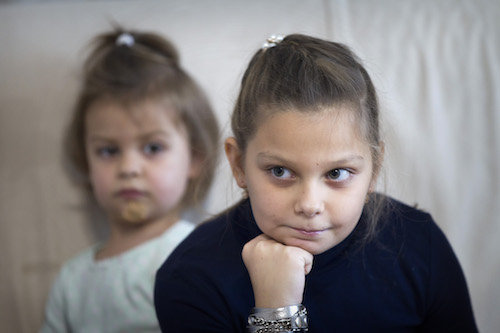
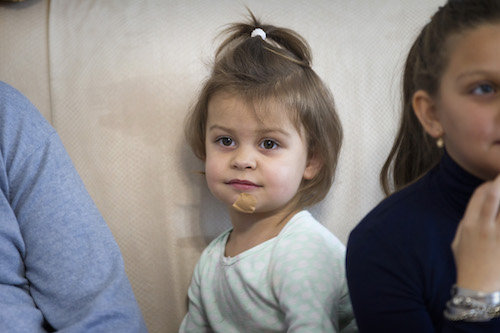
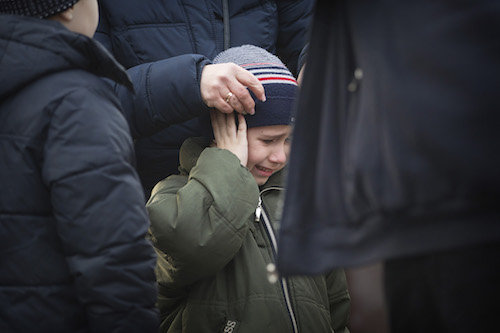
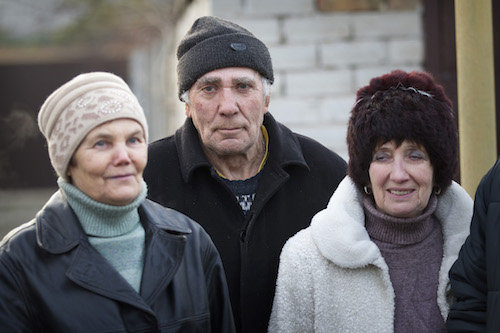
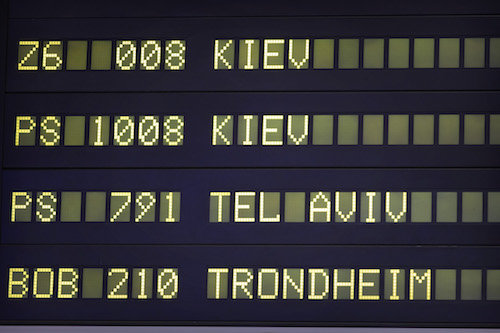
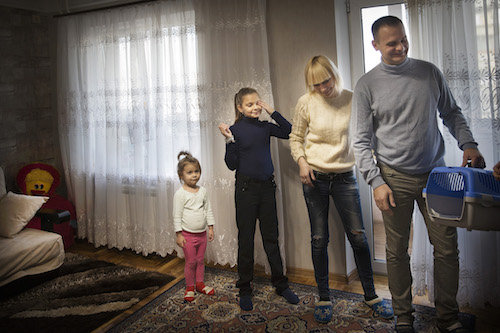
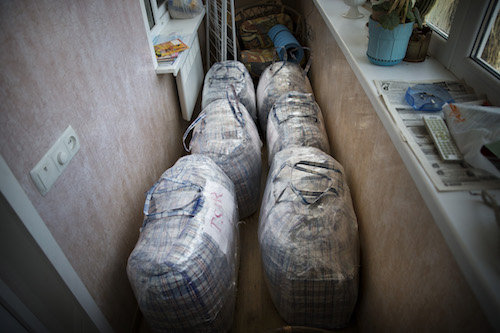
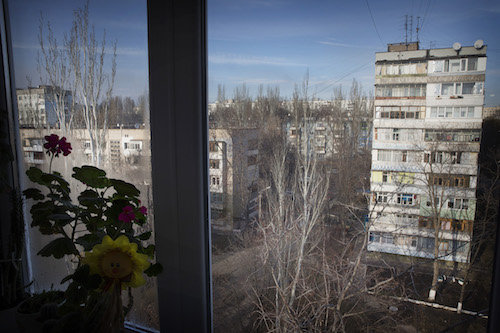
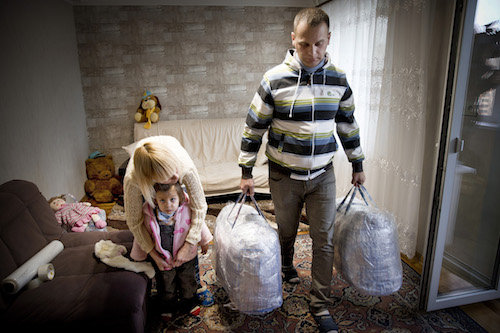
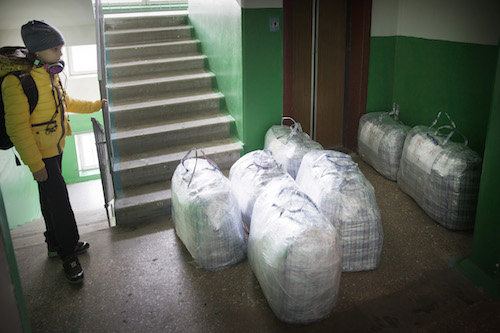
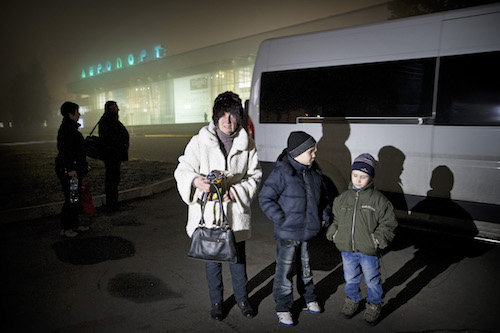
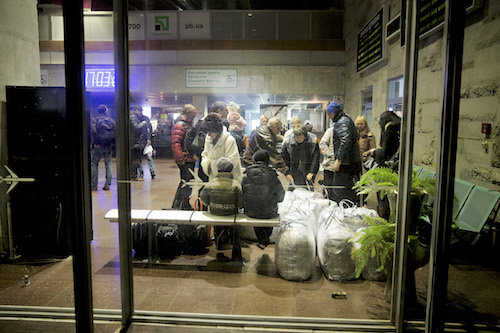
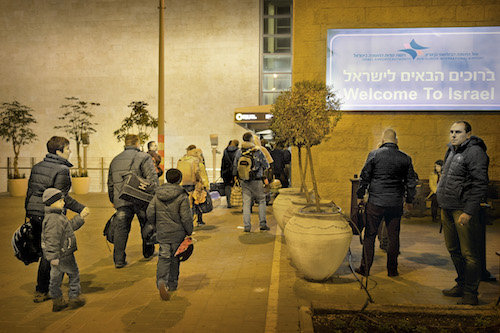
The families Tzarenko and Pleshkov on arrival in Israel. They escape the acts of war in Ukraine and made "aliyah" to the Promised Land.



